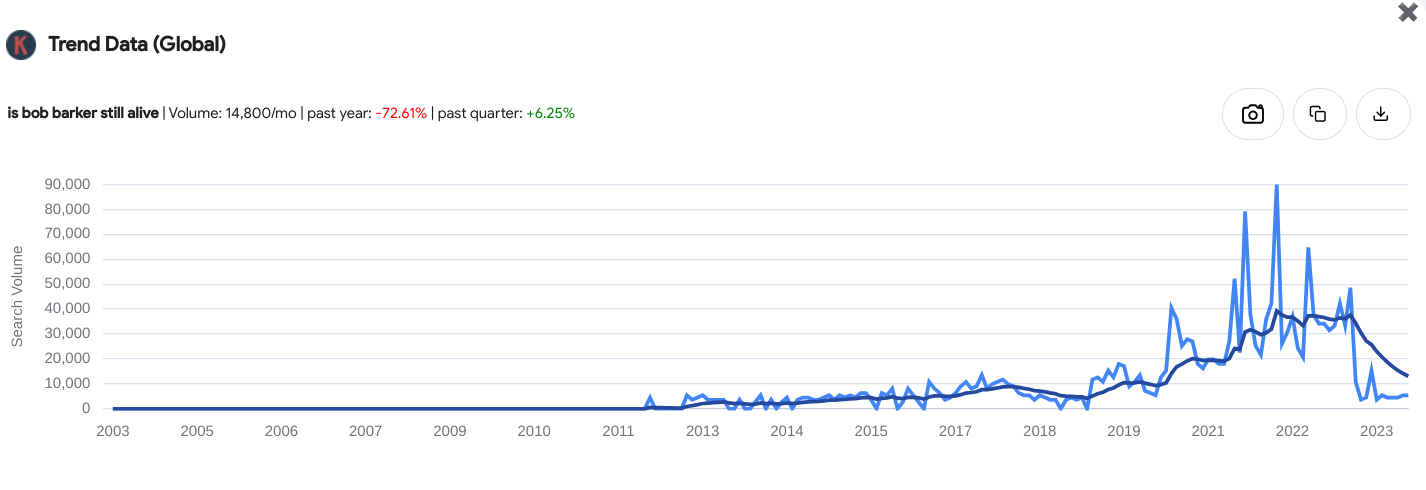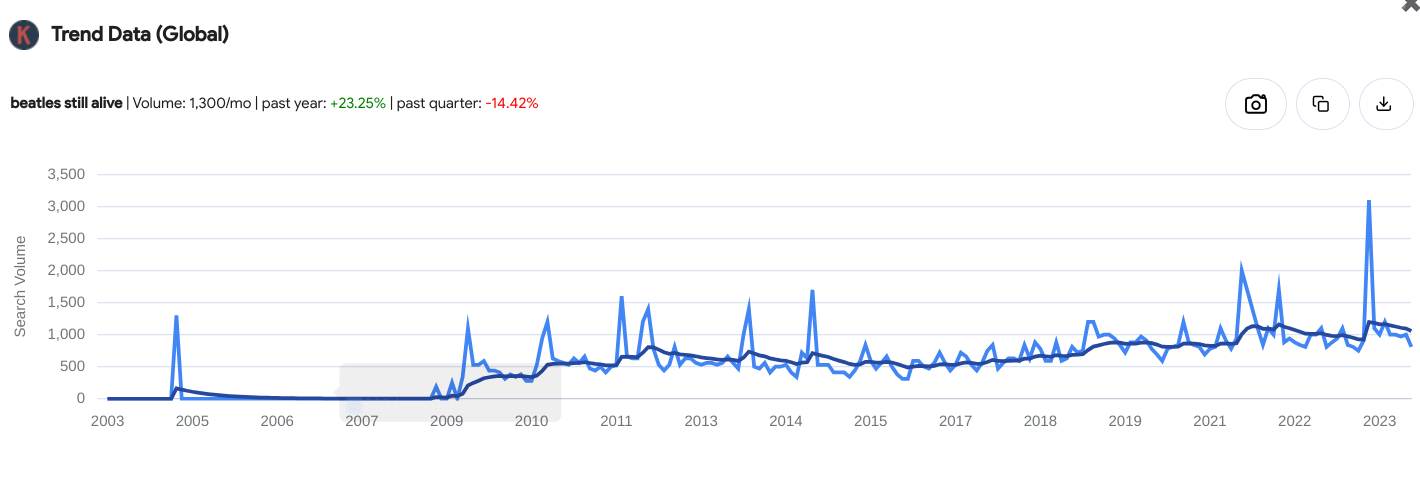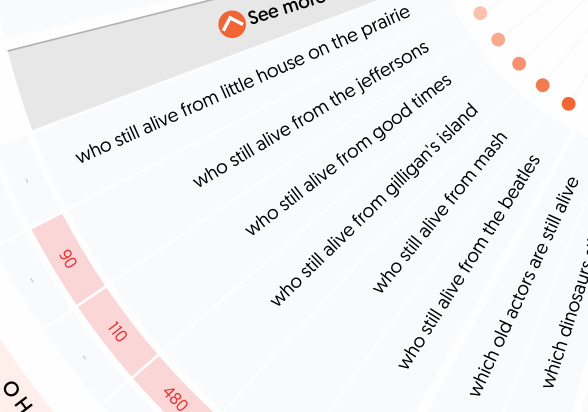Searching for information about Ruth Westheimer’s death yesterday an interesting auto-suggest appeared in my search box: is Dr. Ruth still alive.1 Selecting it, I found that Google provides a Direct Answer to that question using the Knowledge Graph:
There’s low but persistent search interest in this question — Dr. Ruth’s present status — over many years:
This use of Google has interested me for a while now. In fact, Sam Wineburg and I begin our recent book with a discussion of how to confirm or debunk death reports.
So what do people search when pondering the mortality of others? Using an auto-suggest mining tool, I pulled some common “still alive” auto-completes to get a sense of what “still alive” questions people ask. Here’s a bit of what I found.
Is so-and-so still alive?
People often ask whether a particular person is still alive. This can be for a variety of reasons. In some cases it is a query about someone quite old, such as Dr. Ruth, who may be out of the public eye. In other cases — as was the case for is Will Ferrell still alive — it regards a false report or death hoax.2 Other times it is in response to a real reported death.
I’m still a bit distrustful of the keyword volume tool I have,3 but if that tool’s stats are sound one of the higher volume “still alive” searches was for Bob Barker, the former Price is Right host. Searches for is Bob Barker still alive started about ten years ago and peaked in 2022 at a volume of 90,000 searches a month.4 (I think this pattern is right but the volume might be wrong; I put it here in case someone with a better tool can double check it for me).5

Bob Barker bears an interesting relationship to Dr. Ruth — both are part of a class of people that many of us first saw when they were already old — or at least felt old to us. The idea the people much older than us are doing well becomes more comforting as one ages. If Bob Barker is still around, after all, you probably have a lot of road ahead of you too.
A more common search people use is not “still alive” but the person’s name along with “dead” or “death”. However, these searches aren’t fully interchangeable. Searches on whether Bob Barker was dead far outstripped searches on whether he was still alive — until the pandemic, when the pattern temporarily reversed itself.6

Death hoaxes are rare compared to real deaths, and when there is news that a celebrity may have died, people also search the name of the person plus dead. Here’s an example from Tom Petty’s death in 2017 (the “alive” is right behind the “died” line here, the very lowest line).
Targeted searches as clues to topical search motivations
Of course most people don’t do targeted searches. Instead they do topical searches.7
This is something I noticed when watching how students search, but it’s been a useful insight in a variety of contexts. For me a topical search is a search that asks for information on a broad topic — for instance, snails. A targeted search adds keywords to signal a more specific information need, such as snails sleep from a person who is interested in how and when snails sleep.
I found that given a search task students would search one of these two ways. The largest set of students would search topically, on the assumption that once they got to something on the topic they could read that to answer their questions. A smaller set of students would search in a targeted manner, trying to get to a resource that answered their particular question directly.
There really isn’t a correct general approach. Sometimes searches of broad topics get you the answer you want. Sometimes you need to be more targeted. In the case of a death hoax, a topical search usually works well — as we say in our book, if Keanu Reeves has died and you search keanu reeves you will see articles confirming his death. If you see articles talking about the new video game he’s narrating then he’s probably still alive and kicking.
We can get some sense of the ratio of topical to targeted searches by overlaying search volumes. Here we see the impact of a death hoax about Willie Nelson in 2015, with the blue line moving in unison with the red line, which is approximately ten times the total volume, and accounting for about one fifth of the bump. Other targeted terms were used as well, but from my experience, the majority of what we see as the bump in the red line is topical searches that are about the death hoax, ones where the searcher forgoes more targeted terms.
This is not just the case with hoaxes. Here’s that top search above (tom petty dead) compared to all searches with tom petty in them, the vast majority of which are just people searching tom petty.8

One interesting question might be whether shock — or a desire to know more about the circumstances of the death — might be indicated by some of these ratios. For example, here is the pattern for Amy Winehouse…
…and here’s Bob Barker…
It’s idle curiosity at the moment, but maybe I’ll dig into this question in a later post.
How many people in this group are still alive?
People ask other questions as well, around groups of people. The prototypical question of this sort is “Which Beatles are still alive?”

This search appears in response to news events involving The Beatles. For instance, the big spike at the end there is the release of the single “Now and Then”, the song McCartney built from a cassette demo John Lennon left to him, some old work on it by George Harrison, and some new work by him and Ringo.9
Similar questions include who still alive from good times or who still alive from gilligan’s island (Yes, more TV-related searches, it’s my current obsession).

Here’s search volume for the Gilligan’s Island question. As with many targeted queries, the volume is quite low,10 but it adds insight into what the intent behind some larger topical queries might be.11
The spike there in December 2020 is tied to an event — the death, by COVID, of Dawn Wells (Mary Ann on the show). This feels very human to me, the public losing someone like this, recognizing their own mortality, and wondering who’s left from something watched in their youth (in this case, only Tina Louise, or “Ginger”, survives).
Interestingly, Google has a set response for this sort of query based off the Knowledge Graph, which we can see here in response to who is still alive from Star Trek. While it provides the opposite answer (who is dead), I think in this case it’s an exceptionally good result.
That said, the feature does have glitches. The result below tells us the entire cast of Breaking Bad died simultaneously, all at age 83, in Mount Sinai Hospital last year.12 While that might make a good opening to an X-Files episode, I’m guessing Bryan Cranston and Krysten Ritter would beg to differ.
Is this fictional character alive?
We care about our fictional friends too, of course. Another category of “still alive” questions asks whether a favorite character — hero or villain — is dead. In the autosuggest data we find stranger things still alive, which peaks during the 2019 and 2022 releases, with their brutal finales. Subqueries ask about the character Will or others.
One famous TV death debate was around the fan favorite character Glenn in the Walking Dead, who appeared to perish in the October 25, 2015 episode of The Walking Dead. The way his death was shot, however, did not show a body, leaving some hope that he was alive. The speculation would go on until the November 22 episode Head’s Up, which revealed the character had miraculously survived.
As we’ve seen elsewhere, it’s more common when looking at a potential death event to search dead as opposed to alive, and that’s the case with fictional characters too. You see here the stream of searches related to alive are at a fraction of the volume of the ones using the keyword dead. Even when Glenn comes back into the series in November dead and alive are roughly equal.
A similar pattern occurs with the “death” of Jon Snow in Game of Thrones:
These searches are complex, of course — not all of these searches are seeking answers. Some are seeking an article about the subject, or a forum to express their feeling about the events on the show.
How many characters on this show are still alive?
This doesn’t appear to be a common question, but I mention it because there appears to be a way to trigger Google into giving to an overview of character deaths. If you type in characters dead in game of thrones for example, you get a little browsable multi-column list:
Clicking a specific character gives you a series of columned snippets that do a pretty good job of telling you who got offed and how.
The panels aren’t perfect — the one for Battlestar Galactica is missing quite a few deaths and the one that currently comes up for this Breaking Bad search is criminally incomplete. But it’s a neat feature I hope they expand in the future.
Where possible I try to use italics rather than quotes to set off searches to avoid confusion about quotes in search strings.
Will Ferrell has been “dying” from 2006 (paragliding accident) through at least 2018 (car crash).
If people like my writing on this and would like me to get a better keyword volume tool, you can pledge to support this blog if it goes to paid. The better tools cost a couple grand a year. Alternatively, if you have an excellent tool that could help me and would be willing to give me access for free, let me know.
I’ll say this multiple times, but since targeted searches — especially full questions like this — are asked at one to two levels of magnitude less than topical searches, these volumes indicate a much broader but somewhat invisible level of use for the same purpose, making 90,000 monthly search volume notably high.
The reason I think it’s wrong? A similar query for Betty White has only one tenth the volume, and you’re not going to convince me that more people searched on the health of Bob Barker than Betty White.
As noted in the graph caption, the large spike for Bob Barker dead is due to a death hoax; it’s interesting when Barker really died a number of people cited it as an example of a “Mandela effect” — in this case that’s just evidence they were fooled by the hoax.
A topical search is looks for a set of information around a topic (will ferrell), a targeted search uses additional keywords to more directly retrieve a bit of information about that subject (will ferrell dead).
When I was tracking election narratives I used to plot topical queries against targeted queries on a log scale, as one of the things you could do with that was see what was driving a bump. Targeted queries are rare enough compared to topical queries that if you found a targeted query bump (here, tom petty dead) that was one tenth the size or more of the topical query bump (here, tom petty) you could be reasonably sure that the information need defined by the targeted query was a major driver of the the topical query.
Incidentally, you see something here I see a lot which is people’s search behavior seems to change in 2009, and I can’t find any note about the data that would explain it. Possibly a SERP UI change? Or maybe an undocumented stats change?
Again, caveats with this tool.
I don’t know why my keywords volume tool doesn’t show search volumes at this level, but only interest. I think it might be because at this level with whatever method they use the volumes are not reliable, but I don’t know that for sure.
This appears to be a data glitch where all the characters are getting the information for the actor who played Hector.















